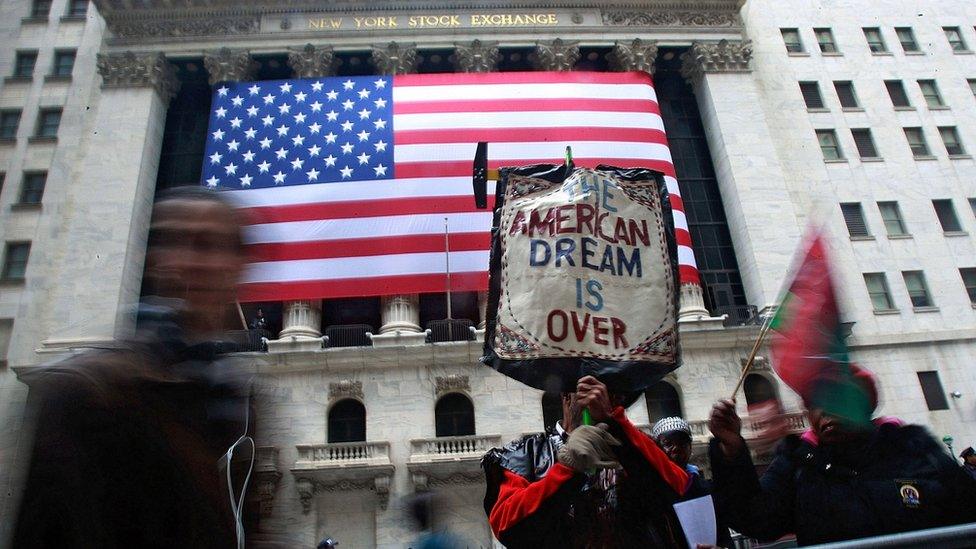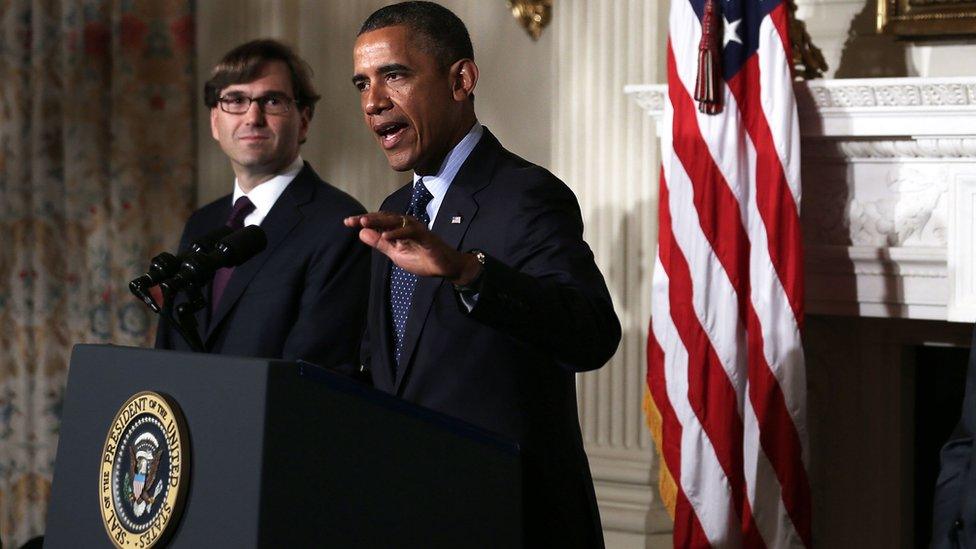Why aren’t salaries growing more?
- Published

It's one of the biggest economic challenges at the moment: with the recession behind us, employment is improving, yet wages remain stubbornly low.
In America, median wages have been stagnant for more than 40 years. In Japan and Germany, it's been 20 years without a pay rise.
And it's a global problem - wage growth has been weak around the world for nearly a decade.
Four experts talk to the BBC World Service Inquiry programme about why wages are so low.

John Van Reenen: The global picture
John Van Reenen is director of the Centre for Economic Performance at the London School of Economics.
"Over the last seven or eight years, wage growth has been very disappointing all over the world. After the Second World War, times were really good.

Wages have fallen sharply in many western economies since the 2008 financial crisis
"Ever since the global financial crisis wage growth, which was doing pretty well over the past 50-60 years - something like 2% a year - fell a lot in richer countries and also fell or stagnated in poorer countries.
"In Britain in particular, wages fell very dramatically - there was a [more than] 10% fall of real wages in the six years after 2008.
"That fall is really unprecedented. We have to go back to the 1920s before you see falls of real wages of anything like that order of magnitude.
"The countries which have been doing better - both before the crisis and afterwards - have been emerging economies.
"China, in particular, has done extraordinarily well. The growth of China since 1980 has led to enormous increases of people's real wages, and even after the crisis, that has continued albeit at a much slower pace than it was before.
"Other countries, including India for example, have also done relatively well."

Christian Dustmann: Reunification's expensive legacy
Christian Dustmann is professor of economics at University College London.
"I remember when the Berlin Wall was falling. While there was a feeling of great happiness at the time, I think the economic consequences for all Germans were vastly underestimated.

The economic legacy of German reunification was as significant as the political fall out
"Germany after 1989 was in a very difficult situation. It had to economically integrate East Germany, which was hidden behind the Iron Curtain for more than four decades and which, in terms of productivity, was about 60% of the level of West Germany.
"At the same time the possibility of people in East Germany to move freely around in the new unified Germany meant that wages had to adjust. So the gap between productivity and wages had to be more or less subsidised by the taxpayer. So the economic burden of that slowed Germany down for at least a decade.
"After the early 1990s, when most of the eastern European countries opened up to become market-based economies, German industry had the possibility to dislocate production into these countries where wages were much lower.
"The papers in the early 2000s were full of articles where yet another company was threatening to move production into eastern Europe, unless worker representatives would accommodate wage restraint and more flexible solutions regarding the workforce.
"So wages, in particular at the lower end of the distribution, actually started to decrease. At the median, wage growth was basically stagnant.
"Wage negotiations were decentralised from the level of the industry [and] region down to the level of the firm. That we believe has been partly responsible for the possibility of German industry to become more competitive.
"I believe the flexible response of the employers and unions played an important part to keep production in many of the core manufacturing sectors in the country, which allowed Germany to be more or less in full employment at the moment, compared to many of its European competitors, where a large part of manufacturing has actually been moving away.
"So wages may have suffered, but the jobs are still in the country, and I think that is far more important."

Machiko Osawa: The end of lifetime employment
Machiko Osawa is professor of economics and director of the Research Institute for Women and Careers at Japan Women's University.
"The three pillars of Japanese employment are lifetime employment, seniority-based wage and also enterprise-based unions. These pillars are very important.

Japanese salarymen's famously challenging working conditions were rewarded with job stability
"The system began to change in the late 1990s. Globalisation was in progress and Japanese companies [began] looking for short-term profits.
"In order to increase profits, you need to reduce labour costs: replacing full-time by non-regular workers.
"So the corporation hires a temporary agency worker but he or she doesn't work for this company, so their employment is relatively insecure. The wage growth is very little, even though you work long years.
"This is a controversial issue. But because it is very difficult for Japanese workers to move to another company, they have to take whatever they are given by the company. So, as a result, Japanese workers do not have a strong bargaining position.
"Job security for regular workers has declined [a] little bit, and the wage growth of regular workers has also suffered.
"This is an international phenomenon because of globalisation and increased competition. I think it reduces full-time employment and increases [the number of] non-regular workers everywhere."

Jason Furman: Squeezed middle
Jason Furman is chairman of President Obama's Council of Economic Advisors.
"[When] I walk into the Oval Office to tell the president the latest employment data, the question I get from him the most often is 'what's going on with wage growth?' That's an issue he wrestles with, throughout what he's doing in public policy, but really at a personal level.

President Obama has focussed on wage growth
"You go into a factory today, and you don't see many people. You see a lot of machines. The number of robots is increasing dramatically year after year. It's most concentrated in sectors like automobile production, but it's spreading throughout the economy.
"If you look over the last 25 years in the US and across the industrial countries, that's what you've seen. Innovations have complemented and enhanced the skills of skilled professionals, replaced jobs from people in the middle, but they haven't replaced the person working in the hospital tending to the patient.
"So, you've seen jobs at either end of the skill distribution growing, those in the middle dropping. And that's been going on for over a quarter of a century now.
"In the US, we produce about $16tn (£11tn) a year. The benefits of that are divided. A substantial portion of it, about $10tn (£7tn), is paid out to workers in wages and benefits, but then companies get profits.
"What we have seen is that portion of how much we make each year that goes to workers in the form of wages has gone down. The proportion going to businesses in the form of profits has gone up and that's just another way in which you just don't get wage increases commensurate with the type of economic growth.
"We've looked at data in the US for the last 100 years and found that when the share of workers in trade unions goes down, the share of income going to the bottom 90% of Americans also goes down and with trade union density at less than 10% right now, it shouldn't be a surprise that the share of income going to the bottom 90% of households, is at a near century-long low."
"There has also been a real change in the institutional dynamics that help shape the distribution of income; the decline of labour unions, the fall in the minimum wage adjusted for inflation, the increased concentration in a lot of industries, the increased number of super-successful companies.
"All of that has contributed to a tilting of income away from labour towards capital and towards managers and people that work for successful companies. And so tackling all of that is also an important part of dealing with inequality in wage growth."
The Inquiry is broadcast on the BBC World Service on Tuesdays from 12:05 GMT. Listen online or download the podcast.
- Published24 February 2016

- Published1 February 2016

- Published15 December 2015

- Published1 April 2016
